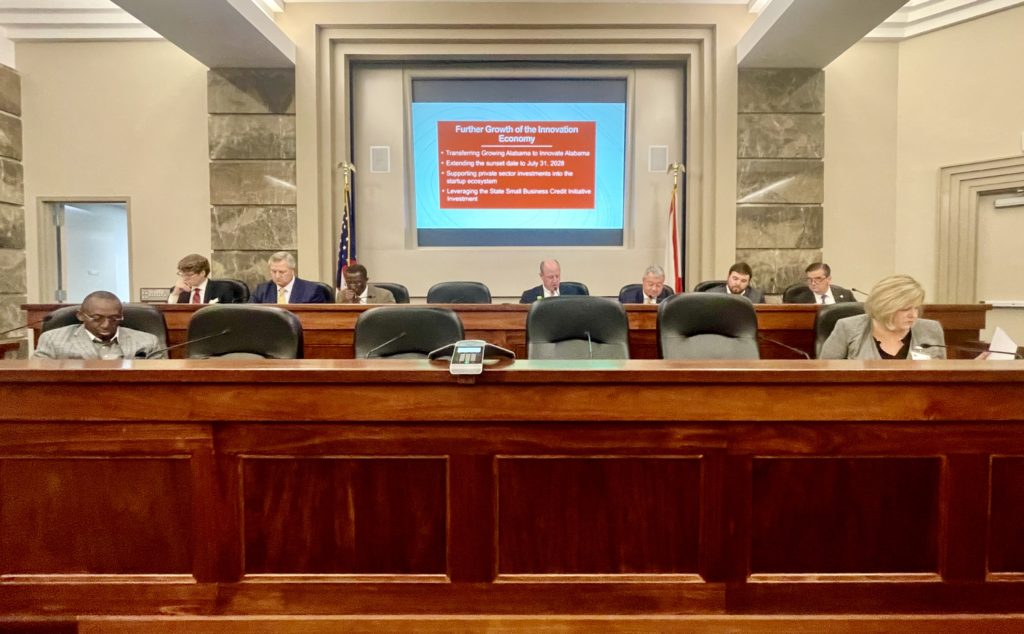
Montgomery, AL – A panel of state lawmakers and industry officials are recommending the state extend and increase its signature tax incentives and create more megasites to lure new industry.
The Joint Legislative Study Commission on Renewing Economic Development Incentives on Monday approved more than a dozen recommendations members said would make the state more attractive to industry. The recommendations will be sent to the Legislature and Gov. Kay Ivey.
“Our goal is simple – we want to have the best incentives not only in the Southeast, but in the nation as a whole,” Lt. Gov. Will Ainsworth, who chaired the commission, said in a written statement after the meeting.
Created in 2015 under the Alabama Jobs Act, the Alabama Jobs Credit and Alabama Investment Credit have helped lure in some of the state’s biggest new employers. The Jobs Credit gives companies cash rebates on their previous year’s payroll for qualified employees. Companies can get higher rebates if they locate in rural parts of the state or hire veterans. The Investment Credit pertains to a company’s capital investment and can be applied to several taxes, including income. Companies can receive the incentives for up to 10 years.
“We know that since 2015, we’ve had 217 projects that have landed in Alabama using the Jobs Act,” Alabama Department of Commerce Secretary Greg Canfield told Alabama Daily News Monday. “That’s created about 38,500 new jobs and attracted $22 billion in new investment.”
On a 10-year basis, the state’s return on its investment is 77%, Canfield said.
But state law caps the incentives at $350 million per year. Canfield has said that because the incentives are “pay-as-you-go,” companies have to perform and create new revenues before they are ever paid an incentive. Earlier this year, Canfield said he’d like to see that cap removed.
The commission is recommending increasing the cap, but didn’t specify by how much.
“We’re not putting an amount on that,” Ainsworth said during Monday’s meeting, noting that Department of Commerce officials have previously said the state is approaching the current $350 million cap, hindering the incentives it can offer some potential employers. “That’s going to be for the Legislature to decide.”
Canfield said Commerce is looking at ways it can work within an increased cap “and still do the work that’s needed to attract new investments and create new jobs.”
Other commission recommendations include:
- Extending both the Alabama Jobs and Growing Alabama incentives until July 31, 2028.
- Making constructing, owning, and operating renewable energy generation a qualifying project under the Jobs Act. According to the commission, more industries want to use renewable energy sources, including solar, and Alabama’s rural communities, with large amounts of available land, are well-positioned to supply it.
- Allowing the State Industrial Development Authority to create “brownfield redevelopment zones,” to provide liability protections for owners who remediate former industrial sites. The authority should also be authorized to issue tax credits to owners who contribute brownfield property to SIDA for redevelopment.
- Making information on all past and future recipients of Jobs Act incentives publicly available, on a rolling basis, after a final project agreement has been executed between the state and the private company.
- Studying how public-private partnerships could improve the operations of the state’s agencies. “Such a study should identify areas where public-private partnerships could bring Alabama’s resources together to deliver comprehensive programs and investment initiatives that incubate innovations, enable sustainable economic growth, and enhance the quality of life for all residents of the state,” the recommendations say.
- Increasing the state’s supply of shovel-ready megasites available for large industry by increasing funding for the Growing Alabama Credit, which allows local economic development organizations to leverage state funds to build industrial parks or other job-attracting sites. Alabama income tax payers can receive tax credits for donations they make to the economic development organizations. Banks and insurance companies can also donate and receive the credits against their financial institution excise tax and insurance premiums tax. The credit is now capped at $20 million.
“We’re almost a victim of our own success on this,” Ainsworth said about major employers landing on the available large sites. “… We’ve had a lot of companies come in, but when you look at our site availability, it’s a big problem.”
Canfield said those megasites are usually at least 1,000 acres and there are still a few available around the state.

